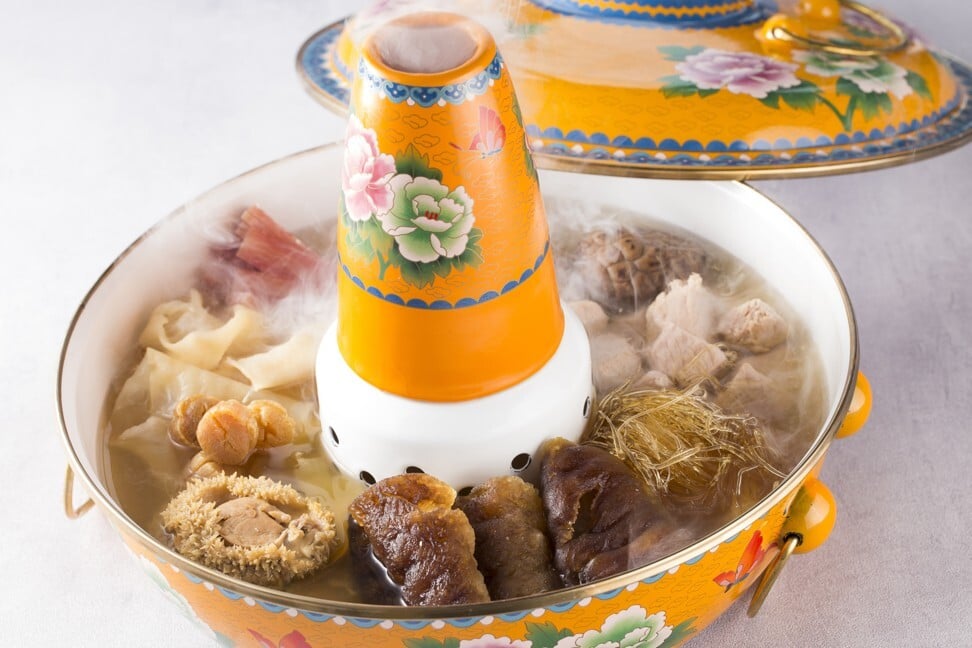Would you pay US$144 for a popular Lunar New Year dish?

A popular dish at Lunar New Year is Buddha Jumps Over the Wall also known as Buddha’s Temptation and Happiness and Longevity.
Originating from the Fujian province during the Qing dynasty, the soup or stew often includes more than 20 ingredients such as quail eggs, bamboo shoots, scallops, sea cucumber, abalone Jinhua ham and taro. It originally featured shark fin, but concerns over environmental issues and the welfare of sharks has inspired many chefs to take out this ingredient and replace it with pork or fish maw.

Why Hong Kong’s most expensive Lunar New Year dish costs HK$6,888
Known for its rich taste, this dish is featured on many menus, especially during Lunar New Year. Yan Toh Heen’s chef Lau Yiu-fai uses double-boiled abalone, fish maw, sea cucumber, conpoy, morchella, bamboo piths, bird’s nest, mushrooms and black chicken in the soup and modern hotpot specialists The Drunken Pot has had it on its Lunar New Year hotpot menu with a broth made of fresh chicken, dried mushrooms, abalone, dried scallops and sea cucumber, but with modern twists of edible flowers and cuttlefish-paste shaped like a fish for decoration.
But how did this auspicious dish get such an unusual name? There are conflicting stories regarding its origin.
The earliest mention of the Buddha Jumps Over the Wall dish appeared in a Song dynasty book (960-1279).
But the most popular version of the tale comes from the Qing dynasty (1644-1912) when an official from Fuzhou was trying to impresses his superior, Zhou Lian. He made a soup, which included ingredients such as pork, duck and chicken, and simmered it slowly in an urn that was used to hold Shaoxing wine. After Zhou tasted the dish he was so impressed he asked the name of the dish. The official did not have a name for the soup, so said it was intended to bring good luck and prosperity, happiness and longevity. One of Zhou’s guests mentioned that the fragrant smell pervaded the neighbourhood, making the monks forget their meditation and jump over the wall to find the dish.
Thai or Lao food? 5 typical dishes to help you see the difference
Another story says that while a scholar was travelling on foot with his friends, during the Qing dynasty, he preserved his food for the journey in a clay jar used for holding wine. He would warm the food in the jar over an open fire, and when they arrived in Fuzhou, the smell spread over to a Buddhist monastery when the monks were meditating. Although the monks were not allowed to eat meat, one monk was tempted and jumped over the wall to try the delicious food.

The soup was introduced to South Korea in 1987 by a Taiwanese chef and played an important role in changing the mainstream Chinese cuisine eaten in the country from Sichuan to Cantonese cuisine. However, in 1989, the Jogye Order of Korean Buddhism opposed the selling of the dish as they said the name was considered blasphemy to Buddhists. Buldojang, as it is known in South Korea, disappeared for a short time, but the controversy only added to its popularity in the country.
6 traditional Japanese foods vegans can enjoy in Osaka
In Malaysia, the popular soup can be bought in a tin for busy families celebrating Lunar New Year, and in 2005 Kai Mayfair on South Audley Street was dubbed, the “home of the world’s most expensive soup” when the restaurant unveiled its version of Buddha Jumps Over the Wall for £108 (US$142). The dish included shark fin, Japanese flower mushroom, sea cucumber, dried scallops, chicken Hunan ham, pork and ginseng.
Want more stories like this? Sign up here. Follow STYLE on Facebook, Instagram, YouTube and Twitter .

A popular dish at Lunar New Year, Buddha Jumps Over the Wall is also known as Buddha’s Temptation or Happiness and Longevity